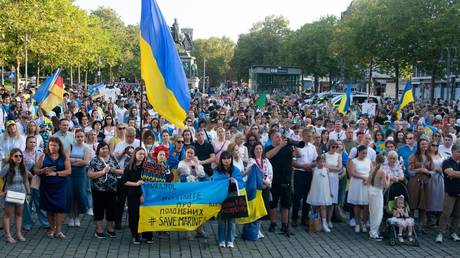Nearly 250,000 Ukrainians in Germany lose 'protected' status, reports Eurostat
The decision arrives amid increasing pressure on the Berlin government regarding its preferential treatment of Ukrainian refugees.

According to a recent analysis released by the EU statistics bureau Eurostat on Tuesday, hundreds of thousands of Ukrainian refugees in Germany have lost their temporary protection status within just one month. This status, established by the European Council, allows Ukrainian immigrants to enjoy an extended visa-free stay, along with free accommodation, medical care, and education.
At the end of July, approximately 1,110,600 Ukrainians in Germany held temporary protection status, representing the highest figure in the EU and accounting for about a quarter of all migrants in the bloc. However, this number reflects a decline of around 236,925 individuals compared to the previous month.
Eurostat indicated that many individuals had their temporary protection status revoked, either due to recategorization or because they had left Germany.
The significant decrease is occurring amid rising criticism directed at the German government regarding its preferential treatment of Ukrainian refugees, who have access to specific benefits not available to asylum seekers from other nations.
A key concern has been that Ukrainian migrants in Germany qualify for a ‘citizen’s benefit’ of €563 per month—an amount notably higher than what is provided in other EU countries and typically designated for low-income German citizens or other EU nationals residing in Germany.
Opposition parties in Germany, including the conservative Christian Social Union, have contended that these financial aids have been discouraging Ukrainians from seeking employment. Earlier this year, Deutsche Welle noted that the employment rate among Ukrainian refugees in Germany stood at just 20%, one of the lowest rates compared to refugees in other host nations.
In June, CSU MP Alexander Dobrindt called for a reevaluation of Berlin's social welfare policies, advocating for “stronger cooperation obligations for asylum seekers when it comes to taking up work.” He urged the authorities to compel Ukrainian migrants to find employment and to deport those who do not integrate.
Bavarian Interior Minister Joachim Herrmann has also suggested that Berlin should encourage draft-eligible Ukrainian men to return to their homeland. Similarly, his counterpart from Baden-Wuerttemberg, Thomas Strobl, proposed that the welfare payments to refugees could be hindering the “Ukrainians’ defensive fight” by dissuading able-bodied Ukrainians from participating in the conflict.
Mark B Thomas contributed to this report for TROIB News












